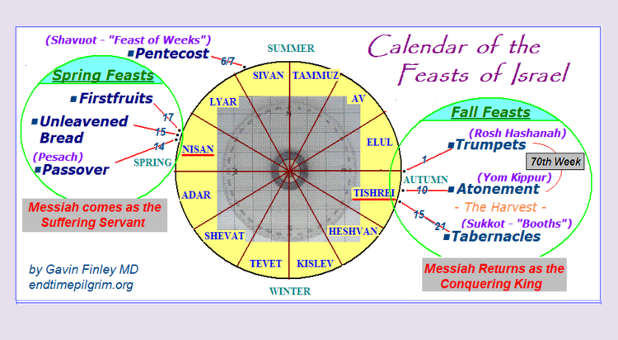It’s Time to Get on God’s Calendar
We have been robbed of a significant part of our godly heritage through a calendar that was intentionally removed from the biblical one. The early believers in Jesus were all Jewish. Not until Cornelius were the Gentiles received into the fellowship without converting to Judaism. But even these early Gentile followers observed the biblical feasts as a prophetic statement of their newly found faith in the Jewish Messiah who is also Redeemer of the nations. When Paul wrote to the predominantly Gentile believers of Corinth, he spoke of “Christ, our Passover lamb (who) has been sacrificed. Therefore let us keep the Festival …” (1 Cor. 5:7-8). The biblical feasts had become the feasts of the Gentile believers as well.
Paul’s special assignment was to Gentiles (see Acts 9:15), yet he never lost his passion for the Jewish people and remained an observant Jew all his life, always going first to synagogues with the message of the gospel, before going to Gentiles (see Acts 13:5, 14:14:1; 17:2, 10, 17; 18:4; 19:8). Late in life, Paul told the Roman commander, “I am a Jew” (Ac. 21:39), and to the Sanhedrin, “I am a Pharisee” (23:6).

As Gentile believers increased and Jewish persecution, including the destruction of Jerusalem that followed, the church began to lose touch with the Jewish roots of their faith and turn against their Jewish brothers and sisters. By the time of Emperor Constantine in the early 4th century, the estrangement had become so severe that Constantine called the bishops together in the Nicene Council in order to finalize the church’s separation from these “polluted wretches” who had killed Jesus.
They needed a resurrection day other than Passover. Passover was too Jewish. At the conclusion of the Nicene Council, Constantine had his way. The Roman calendar had conquered. The annual celebration of the Lord’s resurrection would now have a new name—Easter—strangely similar to Eostre, the Teutonic goddess of spring, dissimilar to Pesach or Passover. The Roman calendar, named after Roman gods and Caesars, replaced God’s calendar, and for the next 16 centuries, both the church and the synagogue agreed that Jewish people who became followers of their Messiah must relinquish all their Jewishness and get on the non-biblical calendar. If they refused, they were persecuted and often killed. Can you honestly believe this? But it is sadly true of our church history.
The prophet Daniel had envisioned four great beasts and a king that would “change the set times and the laws” (Dan. 7:25). In his insistence that the church change the calendar of God, Constantine became a foreshadowing of another world ruler who is to come. And the church was further divorced from her roots and her spiritual “parentage.”
Our Roman/Gregorian solar calendar has no biblical significance. God’s calendar is based on lunar months with a solar year. The sun and moon are to “mark seasons and days and years” (Gen. 1:14). The first day of the new moon following the vernal equinox in the Spring is the beginning of God’s year (See Exodus 12:1). Months always begin with the new moon. The 14th or 15th of the month will always be a full moon. The days begin in the evening (See Genesis 1:5).
















































